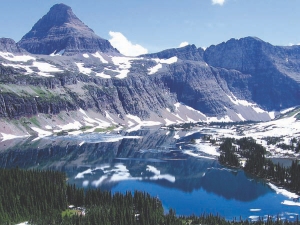VANCOUVER — The British Columbia government has declared it will ban all mining, oil and gas development, and coalbed gas extraction in the Flathead Valley, a 1,600-sq.-km area in the province’s southeast corner.
The decision, announced in the B.C. throne speech, took mining industry members by surprise primarily because of a lack of consultation.
“We’re disappointed at how the decision was arrived at,” said Gavin Dirom, president and CEO of the Association for Mineral Exploration British Columbia, in a telephone interview. “Fundamentally, there was no public consultation and very little science applied to this decision-making process, and that’s of concern.”
Naomi Yamamoto, minister of state for intergovernmental relations, said consultations did take place, but because they were done in confidence she could not say who was consulted or what was said.
The valley will now be off-limits to all commercial activities other than limited logging and any current mining or exploration activities in the area are suspended. Several companies are affected: coal explorer Cline Mining(CMK-T), has already spent millions of dollars advancing its Lodgepole coal project through feasibility studies and defining a sizable resource at its Sagecreek coal property, while Max Resources (MSR-V) spent close to $800,000 last year exploring the early-stage Crowsnest and Howell gold projects, in which it is earning a 60% interest from Eastfield Resources (ETF-V). Dozens of individuals also hold claims in the area.
“It’s a substantially rich area in terms of mineral potential,” Dirom said. “We would like to have the opportunity to demonstrate to the public that something is feasible, that mitigation measures could be implemented that would be appropriate and reasonable and a possible project could go forth.”
B.C.’s Flathead Valley has been the subject of intense lobbying against development in recent years. The area lies on the Montana border, alongside Glacier National Park, and much of the lobbying for protection has come from south of the border.
Montana’s Democratic Senator Max Baucus has been especially vocal on the issue and had already helped convince BP Canada Energy, a subsidiary of BP (BP-N), to withdraw plans for a coalbed methane project in the area.
In January a team of scientists from the United Nations added to the debate when they recom- mended a moratorium on mining in the valley, which is home to the largest population of inland grizzly bears on the continent. The valley is an important corridor for animals moving north and south through the Rocky Mountains and has been called one of the most biologically important places on earth by several biologists because of its plant and animal diversity.
Nevertheless, until the throne speech the B.C. government had not indicated it was going to completely ban mining operations in the area and was still issuing drilling and exploration permits.
Cline Mining had been advancing plans for a 2-million tonne-per-year, open-pit coal mine, tapping into a measured and indicated resource of 155 million tonnes of low volatile bituminous coal for use in steelmaking, though Cline suspended operations in the Flathead Valley last year because of a temporary moratorium on open-pit mining.
Max Resources’ president, Stuart Rogers, said his company was given no indication the government was even considering banning mineral exploration.
“We’re quite surprised because we’ve been working on permits and they were going through the motions, and I think probably in the lower end, where we were dealing with, was surprised too,” Rogers said. “We had filed an application and they were working with us and we were getting all excited about exploration in May, once the snow melts.”
Rogers was quick to add he did not think anyone misled him, but he was still surprised because the indications he got were that the B.C. government “wouldn’t let Montana boss them around.”
Yamamoto said the decision to ban mining was part of a broader plan to develop a memorandum of understanding on environmental issues with Montana.
Rogers was also thankful John Cavanagh, assistant deputy minister of the Ministry of Energy, Mines and Petroleum Resources, called him to explain what was going on and was open to talk of compensation. Rogers said he just wants something that is fair.
“I don’t want to be unreasonable, but we put time and effort in here and we’ve got to recover capital for our shareholders,” Rogers said.
Max Resources shift its attention to its projects in Nevada, though a third of the company’s market capitalization was wiped out when its share price fell to 23¢ from 36¢ over several days. As to whether he will develop properties in B.C. again, Rogers said it will depend on how Max Resources is treated with respect to compensation.
“The key will be: are we treated fairly,” Rogers said.
Dirom, however, highlighted the uncertainty a decision like this brings to the industry in B.C. And this is not the first government decision that has surprised the industry.
“If it can happen in the Flathead it can happen elsewhere without due process,” Dirom said. “As mineral explorers, we’ve been surprised by a number of announcements, whether it’s a ban on uranium and thorium exploration, again with very little process or public consultation. So on the exploration side it’s very concerning these decisions are taken without a lot of input or consultation.”
Yamamoto said this was a one-off decision and B.C. is still open for mining.
“Mining is one of our most important industries. This is something we did to a small specific area. We have no intention of looking at doing this anywhere else,” she said.


Be the first to comment on "BC Bans Exploration And Mining In Flathead Valley"